|
|
|
|
The following locations may be of interest. They are places
that we have discovered since visiting the area, but everytime
we go, we find more beauty spots and more fantastic areas to
visit. There are undoubtedly many beautiful areas that we
have yet to stumble across. If you have any recommendations,
then please
email us at
info@escapetoitaly.co.uk.
|
|
|
|
Lecce (The Region's Capital City)
|
|
|
|
As the capital of the province with the same name,
Lecce is the jewel of the Salentine peninsular.
The old town has some of the finest
examples of baroque churches, and even a couple of
2nd century Roman
amphitheatres which have been excavated
and are used today
for outdoor concerts and plays.
The town really comes alive in the evening, when hundreds of
shops open their doors, buskers entertain the crowds, all
the bars and restaurants set out
their outdoor seating, and the floodlit streets fill with
people and a real party atmosphere!
|
|
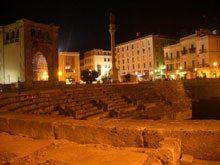
|
|
|
|
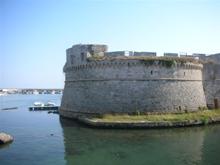
|
|
Gallipoli: Once you pass through the rather un-inspiring
new town of Gallipoli and over the
bridge, you come across the beautiful old town, located on a
small island surrounded
by the crystal clear Ionian Sea.
This old Greek city is a maze of meandering and twisting
whitewashed streets, with beautiful churches, fantastic restaurants,
and a real sense of community amongst the fishermen, as they
sit together mending their fishing nets.
Only the Aragonese castle, which sits in one corner
of the island, serves as a reminder that this is still Italy.
|
|
|
|
Porto Cesareo: A town with a beautiful marina, incredible
sunsets, a vast array of fish markets (I didn't know there were so
many types of squid) and a wonderful atmosphere. As well as the
great shops and restaurants, there is a range of water sports such
as snorkeling, wind surfing and canoeing.
|
|
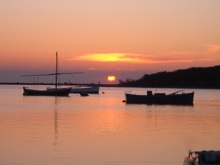
|
|
|
|
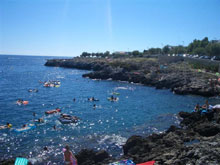
|
|
Sta. Caterina: One of the most popular seaside towns in
the area (and the location of the first house shown to us on
A Place in the Sun) due to its rugged coastlines, clean beach,
attractive marina and many restaurants overlooking the
sea. This town comes alive in the summer when Italian tourists
flock to the area to dive off the rocks and soak up the sun.
|
|
|
|
Sta. Maria di Leuca: The Lands End of the Salentine
peninsular, this town sits at the very southern tip of Puglia. After
a scenic drive along the coastal roads, you can climb to
the top of the headland to see the lighthouse which made
Leuca famous, and the Basilica De Finibus Terrae
(End of the Land). Perhaps the best
reason to climb to the top of the promontory
however, is the incredible view over the meeting of the
Adriatic and Ionian seas.
|
|
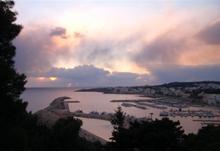
|
|
|
|
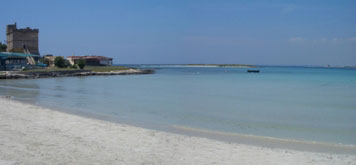
|
|
Sant'Isidoro: A beautiful white sandy beach and
crystal clear, turquoise waters ... what more can you say!
|
|
|
|
Otranto: Otranto is another example of beautiful
bell towers, ornate churches, winding cobbled
streets and fantastic views over the sea.
It is one of the most easterly points of Italy and,
because of its position, has been the target for many
conquerors. As a result, the town is steeped in history,
having been occupied (in one form or another)
by the Greeks, the Romans, the Turkish, and was even home to the
French for a time.
|
|
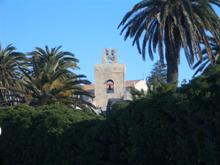
|
|
|
|
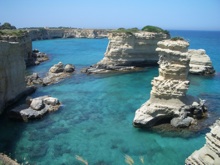
|
|
Adriatic Coastline: The coastline up from Otranto is rugged, wild
and absolutely beautiful. There are incredible rock formations, fields of
wild flowers, secluded beaches and fabulous coastal walks.
In amongst this fabulous coastline is one of the most beautiful beaches
of the Salentine Peninsular (in my opinion at least), Torre dell'Orso.
|
|
|
|
Torre dell'Orso: Powder white sand, clean beaches,
sun loungers for those
that want them (though there's plenty of beach without them), and
views of the Two Sisters rock formation (shown in
the distance here).
The beach is very popular in the peak season, but has
good facilities, is spotlessly clean, and has safe,
shallow, crystal clear waters to swim in (some people
even liken it to the Maldives).
|
|
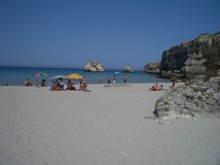
|
|
|
|
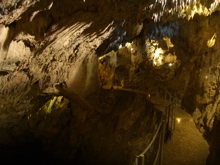
|
|
Castro: The famous Castro grottos are located just to
the north of the medieval town and castle of Castro.
These are one of the most important prehistoric sites in Italy, and
are open to the public for a small fee (approx. 4 euros per person).
The caves feature huge caverns, and narrow
walkways through the beautiful stalactites and stalagmites.
|
|
|
|
Inland
Ostuni: One of the most stunning
cities in Puglia, made famous by the dazzling whitewashed
houses and winding, steep alleyways. The city of Ostuni
is made up of a series of levels, staircases and small roads,
and the views from the top show miles upon miles of olive groves
and an amazing view of the Adriatic Coastline in the distance.
|
|
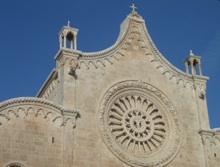
|
|
|
|
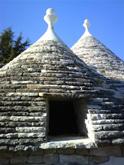
|
|
Alberobello: Commonly known as The Capital of the
Trulli, the town is perhaps
one of the most well known tourist spots within
Puglia, made famous by the unusual 14th century
Trulli buildings.
The trullo is a fascinating architectural feature of this
area of Puglia, a building with conical roof made without mortar.
Many of the giftshops and cafes are
located inside
the unusual conical buildings, and although the main highstreet is
slightly more conventional, it also boasts fantastic architecture
and a lovely atmosphere.
The town is bustling during the summer months, but remains open out
of season too.
|
|
|
|
Alberobello also been designated a UNESCO
world heritage site because of its quite unique architecture.
Not only this, but the surrounding countryside
is beautiful, with rolling green fields,
vineyards and olive groves.
|
|
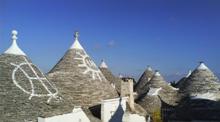
|
|
|
|













